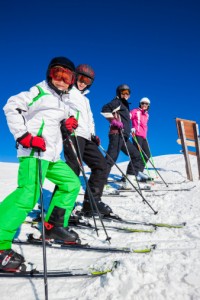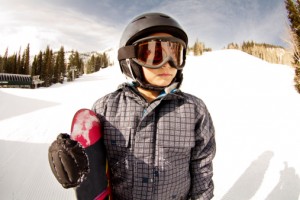‘Tis the season for snow sports, and people nationwide are flocking to their favorite slopes for a day of skiing or snowboarding. The good news this year is that helmet use is on the rise. According to the National Ski Areas Association (NSAA), 66.8% of snow-sport participants can be seen wearing helmets. The odd news, considering this statistic, is that head injuries are also on the rise.
What’s Going On?
 Increased helmet use should mean a decrease in head injuries. Several factors could play a role in why head injuries are on the rise. Increased risky behavior is likely partially responsible. Athletes are pushing their limits more and more each year, trying harder and riskier stunts. These stunts come with an increased risk of traumatic brain injury. Another factor likely contributing to the rise is that more head injuries are being diagnosed and treated as the awareness of concussion increases. This is actually a very positive development. Recognizing and getting treatment for traumatic brain injury is key to preventing second-impact syndrome, caused by a second blow to the head before the initial concussion heals. Second-impact syndrome can be deadly serious.
Increased helmet use should mean a decrease in head injuries. Several factors could play a role in why head injuries are on the rise. Increased risky behavior is likely partially responsible. Athletes are pushing their limits more and more each year, trying harder and riskier stunts. These stunts come with an increased risk of traumatic brain injury. Another factor likely contributing to the rise is that more head injuries are being diagnosed and treated as the awareness of concussion increases. This is actually a very positive development. Recognizing and getting treatment for traumatic brain injury is key to preventing second-impact syndrome, caused by a second blow to the head before the initial concussion heals. Second-impact syndrome can be deadly serious.
Don’t Let a Head Injury Ruin Your Day on the Slopes
Stay safe on the slopes by wearing proper gear and skiing within your abilities. Wear a helmet designed for skiing and snowboarding that fits properly. The NSAA provides quality information on proper helmet use. Remember, however, that a helmet does not make you invincible. A fall or collision can still cause a brain injury, though it will likely be less serious if you are wearing a helmet. Skiing and snowboarding are supposed to be fun and challenging, so have fun and try new things, but know your limits and respect them.
I Fall All the Time. How do I Know if I Have a Concussion?
Falling is often par for the course in snow sports, especially for beginners. Not all falls cause traumatic brain injuries, but you may not realize immediately if one does. Alexis Krisay of Phoenix, Ariz. had one such experience when snowboarding at Mammoth Mountain in California. She was wearing a helmet when she caught an edge and fell backward, hitting her head. She initially shook off the fall, but on the lift she began to feel nauseous and fading in and out of consciousness. Her husband recognized that something was wrong and got her off the mountain. In team sports you have a coach looking out for signs of concussion, but when you are on the slopes, there is only you and your buddies. Know the signs and symptoms of concussion and if you suspect you have one, call it a day and go to the doctor.
Signs:
- Dazed or stunned
- Confused
- Forgetful
- Clumsy
- Loss of consciousness
- Mood or behavioral changes
- Inability to recall events prior to or after the fall
Symptoms:
- Headache
- Nausea
- Dizziness
- Double or blurry vision
- Sensitivity to light or noise
- Feeling groggy or sluggish
- Memory loss
- Confusion
 Contact Us
Contact Us
Traumatic brain injury is a serious matter. When engaging in risky activities you have the responsibility to act with caution, but operators also have a responsibility to maintain the premises and take necessary action to provide a safe environment. Failure to do so puts athletes in harm’s way and may count as negligence. If you or a loved one has experienced a traumatic brain injury, please contact us immediately as you may be eligible for compensation. We provide a free consultation with one of our experienced attorneys to discuss your legal options.



Hi Guys,
In Australia they are looking at making helmuts compulsory. In fact, the travel insurance companies are pushing this for claims as well as the skiing association.
smithslawyers.com.au